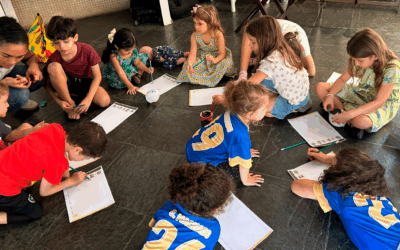 Four days to talk about economy, culture, politics, the region and the young. Many concrete examples of “active citizenship” were shared at LoppianoLab in a programme that unfolded in workshops, seminars, testimonies by business people, an area for the Economy of Communion, courses on political involvement by the Political Movement of Unity and the Sophia University Institute. A close-up on “what the focolarini think now that Chiara Lubich is gone” through a presentation of the new book, La scommessa di Emmaus (the challenge of Emmaus), an interview with Focolare president Maria Voce. An early count of the participants places the number at around 3,000 people from every Italian region, plus another 5,000 who were linked up via internet with the different moments of the programme. Some came to Loppiano for the day. One social network had allowed the social network public to interact in the events, involving 300,000 contacts.
Four days to talk about economy, culture, politics, the region and the young. Many concrete examples of “active citizenship” were shared at LoppianoLab in a programme that unfolded in workshops, seminars, testimonies by business people, an area for the Economy of Communion, courses on political involvement by the Political Movement of Unity and the Sophia University Institute. A close-up on “what the focolarini think now that Chiara Lubich is gone” through a presentation of the new book, La scommessa di Emmaus (the challenge of Emmaus), an interview with Focolare president Maria Voce. An early count of the participants places the number at around 3,000 people from every Italian region, plus another 5,000 who were linked up via internet with the different moments of the programme. Some came to Loppiano for the day. One social network had allowed the social network public to interact in the events, involving 300,000 contacts.
The major topics that were discussed included electoral law, interculturalism, legality, art, sustainable development and many others that were presented in fifteen laboratories that led to the Saturday afternoon event, entitled “Italia Europa. Un unico cantiere tra giovani, lavoro, innovazione” (Italy, Europe, a single field between youth, work and innovation). A lively discussion followed with experts on economy, training and Europe in which the young people were very involved in making a contribution toward the rebirth of Italy.
 Regarding the realtionships among the generations, journalist Tiziana Ferrario riterated the importance of growing together – young people and adults – in a mutual exchange between passion and experience. “There is a more need for a Europe of the citizens,” declared Paolo Ponzano, counselor of the European Special Commission. His words were echoed by economist Stefano Zamagni, recalling the need for a more mature democracy at an international level, in which the citizens participate daily in the management of public affairs.
Regarding the realtionships among the generations, journalist Tiziana Ferrario riterated the importance of growing together – young people and adults – in a mutual exchange between passion and experience. “There is a more need for a Europe of the citizens,” declared Paolo Ponzano, counselor of the European Special Commission. His words were echoed by economist Stefano Zamagni, recalling the need for a more mature democracy at an international level, in which the citizens participate daily in the management of public affairs.
A high moment was the double interview with Maria voce, president of the Focolare, who has just been named an auditor of the upcoming Synod of Bishops on the New Evangelization, who responded to the questions of Lucetta Scaraffia (Osservatore Romano)and Marco Politi (Il Fatto quotidiano), on issues facing the Church and society: the role of women, interreligous dialogue and relations with those of “different beliefs”.
 At LoppianoLab citizens, experts and professionals spoke of Italy in crisis, but also of Italy on the rise, with the same common denominator: a passion for civil participation. The laboratory entitled “The stalling of the parties. A politics for the technicians. And the Citizens?” in which the issue of electoral law was discussed, which is a very hot topic in Italy. In full harmony with this was the seminar offered by the Courses on participation in politics, twenty four such courses underway throughout Italy today, involving 500 youths. “Provide us with true educators and we’ll provide you with a better world” was the title of a laboratory that pointed out the centrality of education as one resource for a better future. Stories of hopes and battles enlightened the laboratory on legality, such as that of business man Salvatore Cantone, who is engaged on the front lines with an anti-racketeering association and Giuseppe Gatti, anti-mafia magistrate and undercover, which which highlighted that a new legality can only be born from fraternity. The workshop entitled
At LoppianoLab citizens, experts and professionals spoke of Italy in crisis, but also of Italy on the rise, with the same common denominator: a passion for civil participation. The laboratory entitled “The stalling of the parties. A politics for the technicians. And the Citizens?” in which the issue of electoral law was discussed, which is a very hot topic in Italy. In full harmony with this was the seminar offered by the Courses on participation in politics, twenty four such courses underway throughout Italy today, involving 500 youths. “Provide us with true educators and we’ll provide you with a better world” was the title of a laboratory that pointed out the centrality of education as one resource for a better future. Stories of hopes and battles enlightened the laboratory on legality, such as that of business man Salvatore Cantone, who is engaged on the front lines with an anti-racketeering association and Giuseppe Gatti, anti-mafia magistrate and undercover, which which highlighted that a new legality can only be born from fraternity. The workshop entitled
Comunic@ando presented a series of projects: civic workshops, critical use of the media and a European project that involved Italian young people in a partnership with citizens of four other nations. The 3rd National Convention of Economy of Communion (EoC) was held in Loppiano at the Polo Lionello (Lionello Industrial Park). The novelty this year was the birth of AIPEC, an Italian association of the EoC and the voice of the young people: an overview of the year’s activity at the industrial park that was the incubator for 52 business projects; the Policor project in response to the high rate of unemployment among the young people in Italy. Now that the event has ended, the workshops continue at local sites across Italy. Active participation is the key in looking toward 2013.




0 Comments